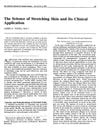 5 citations,
January 2005 in “Cytotherapy”
5 citations,
January 2005 in “Cytotherapy” The meeting highlighted important advances in stem cell research and its potential for creating new medical treatments.
 1 citations,
July 2020 in “bioRxiv (Cold Spring Harbor Laboratory)”
1 citations,
July 2020 in “bioRxiv (Cold Spring Harbor Laboratory)” Removing centrosomes from skin cells leads to thinner skin and stops hair growth, but does not greatly affect skin cell differentiation.
 1 citations,
July 2020 in “Dermatology”
1 citations,
July 2020 in “Dermatology” Photobiomodulation helps reduce pain, lessen inflammation, heal wounds, and can be used in skin treatments. It also boosts hair growth in women with hair loss and may help fight microbes and prevent respiratory issues in COVID-19.
 1 citations,
January 2010 in “Springer eBooks”
1 citations,
January 2010 in “Springer eBooks” Certain micronutrients may improve hair and nail health, but more research is needed to confirm their benefits.
 February 2024 in “PloS one”
February 2024 in “PloS one” Nutraceuticals that promote hair growth do not reduce tamoxifen's effectiveness in breast cancer treatment.
 March 2021 in “Actas Dermo-Sifiliográficas”
March 2021 in “Actas Dermo-Sifiliográficas” The microbiome may be linked to hair loss and could be a target for new treatments.
 March 2014 in “Medicina cutánea ibero-latino-americana”
March 2014 in “Medicina cutánea ibero-latino-americana” Melatonin applied to the scalp helps increase hair density in people with early hair loss.

Melatonin applied to the scalp helps treat early-stage hair loss in men and women.
 January 2011 in “Side effects of drugs annual”
January 2011 in “Side effects of drugs annual” Tretinoin gel is safe for sun exposure, but tacalcitol doesn't significantly improve non-segmental vitiligo.
 June 1997 in “The American Journal of Cosmetic Surgery”
June 1997 in “The American Journal of Cosmetic Surgery” Understanding the science of skin stretching is crucial for safe and effective hair replacement techniques.
 September 2017 in “Journal of Investigative Dermatology”
September 2017 in “Journal of Investigative Dermatology” Injections of special skin cells showed potential in treating hair loss, with some participants experiencing increased hair density.
 134 citations,
December 2018 in “Dermatology and Therapy”
134 citations,
December 2018 in “Dermatology and Therapy” Some vitamins and minerals like vitamin D and iron can help with certain types of hair loss, but more research is needed for others.
 21 citations,
August 1994 in “Clinical endocrinology”
21 citations,
August 1994 in “Clinical endocrinology” 5α-Reductase inhibitors can help treat hair loss, acne, and prostate issues by reducing DHT levels.
 7 citations,
January 2017 in “Journal of cosmetology & trichology”
7 citations,
January 2017 in “Journal of cosmetology & trichology” Good nutrition is crucial for healthy hair and can help with hair loss without medication.
 April 2023 in “The journal of investigative dermatology/Journal of investigative dermatology”
April 2023 in “The journal of investigative dermatology/Journal of investigative dermatology” Noncoding dsRNA helps produce exosomes that aid in skin regeneration.
51 citations,
November 1998 in “The journal of investigative dermatology/Journal of investigative dermatology” Beard cells, unlike scalp cells, produce growth factors in response to testosterone, which may explain differences in hair growth.
 31 citations,
March 2013 in “Gene”
31 citations,
March 2013 in “Gene” Signaling pathways are crucial for hair growth in goats.
1 citations,
November 2022 in “Journal of Investigative Dermatology” ALRN-6924 may prevent hair loss caused by chemotherapy.
 April 2023 in “Journal of Investigative Dermatology”
April 2023 in “Journal of Investigative Dermatology” ALRN-6924 can protect hair follicles from chemotherapy damage by temporarily stopping cell division.
148 citations,
October 2008 in “The journal of investigative dermatology/Journal of investigative dermatology” Mice without the vitamin D receptor are more prone to UV-induced skin tumors.
 10 citations,
May 2012 in “PloS one”
10 citations,
May 2012 in “PloS one” Low ERCC3 gene activity is linked to non-pigmented hair growth.
 9 citations,
October 2008 in “British Journal of Dermatology”
9 citations,
October 2008 in “British Journal of Dermatology” The growth of the Epstein-Barr virus in the patient's cells was linked to the worsening of her lymphoma.
 6 citations,
August 2022 in “Science immunology”
6 citations,
August 2022 in “Science immunology” Foxn1 gene regulation is crucial for thymus development but not for hair growth.
6 citations,
March 2022 in “International journal of molecular sciences” Natural skincare products may help reduce sun damage and support the skin's daily cycle.
 1 citations,
December 2022 in “The journal of investigative dermatology/Journal of investigative dermatology”
1 citations,
December 2022 in “The journal of investigative dermatology/Journal of investigative dermatology” Choosing the right method to separate skin layers is key for good skin cell research.
1 citations,
March 2022 in “IntechOpen eBooks” Aging reduces skin stem cell function, leading to changes like hair loss and slower wound healing.
 June 2024 in “Computational and Structural Biotechnology Journal”
June 2024 in “Computational and Structural Biotechnology Journal” Multi-omics techniques help understand the molecular causes of androgenetic alopecia.
April 2024 in “Biomolecules” Exosomal miRNAs from stem cells can help improve skin health and delay aging.
 December 2023 in “Farmateka”
December 2023 in “Farmateka” Minoxidil is an effective and safe treatment for common hair loss when applied to the skin, but more research is needed for optimal use.
 July 2021 in “Open access journal of biomedical science”
July 2021 in “Open access journal of biomedical science” A lotion with natural extracts significantly sped up hair growth in women with hair loss from chemotherapy.























